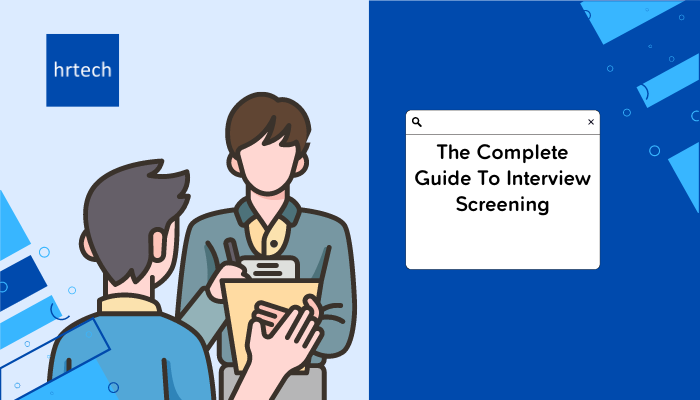Looking for a simplified hiring process to find the best candidates for open positions?
Interview screening is a crucial step that can save you time and ensure you’re focusing your efforts on the most qualified applicants.
In this complete guide, we cover everything you need to know about interview screening, from its purpose, types, and interview screening questions to tips for conducting effective screening interviews. Keep reading till the end to explore more.
What is Interview Screening?
Interview screening is the initial step in the hiring process where a company representative, usually from HR or a hiring manager, conducts a preliminary interview with a candidate.
The main purpose of a screening interview is to determine if the candidate meets the basic qualifications for the role and if they would be a good fit for the company culture.
Screening interviews are typically shorter than in-depth interviews and can be conducted over the phone, via video chat, or in person.
The goal is to narrow down the applicant pool and identify the candidates who should move forward to the next stage of the hiring process.
Why Conduct Screening Interviews?
There are several key benefits to conducting screening interviews:
- Save time and resources – With the upfront candidate screening, you can avoid spending time on in-depth interviews with applicants who aren’t a good fit.
- Ensure candidates meet basic requirements – Screening interviews allow you to verify that candidates have the necessary skills, experience, and qualifications for the role.
- Assess fit with company culture – A screening interview gives you a chance to gauge the candidate’s communication skills, professionalism, and alignment with your company’s values.
- Identify potential issues early – Screening interviews can help you spot potential issues or concerns about a candidate’s background or qualifications before investing more time in the hiring process.
Want to improve your HR team’s skill sets? At hrtech, we offer top HR training programs and courses. Visit hrtech now to explore more.
Types of Screening Interviews
There are three main types of screening interviews:
| Type: | Pros: | Cons: |
| Phone | Cost-effective, can be conducted remotely | Limited ability to assess body language and nonverbal cues |
| Video | Allows for face-to-face interaction, can be conducted remotely | Requires technology setup and reliable internet connection |
| In-Person | Provides the most comprehensive assessment of a candidate | Time-consuming and may not be necessary for all positions |
The type of screening interview you choose will depend on factors such as the location of the candidate, the level of the position, and your company’s resources and preferences.
Screening Interview vs. Interview
While screening interviews and traditional interviews share the goal of assessing a candidate’s suitability for a position, there are some key differences between the two:
| Difference: | Screening Interview: | Interview: |
| Purpose | Determine if the candidate meets basic qualifications and is worth pursuing further | Assess the candidate’s fit for the role and company in more depth |
| Length | Typically 15-30 minutes | Typically 30-60 minutes or longer |
| Format | Often conducted by phone or video | Usually conducted in-person |
| Questions | Focus on verifying qualifications, experience, and interest in the role | Cover a wide range of topics, including job-specific skills, work style, and career goals |
| Outcome | Decide whether to invite the candidate for a more in-depth interview | Make a hiring decision or determine next steps, such as an additional round of interviews |
Screening interviews are an initial filter to identify qualified candidates, while regular interviews provide a more detailed evaluation of a candidate’s suitability for the role.
Read More: 7 Best Candidate Screening Software For Effective Hiring
Who Should Conduct Screening Interviews?
Screening interviews are typically conducted by:
- HR professionals
- Recruiters
- Hiring managers
The ideal screener should have a thorough understanding of the job requirements and company culture. They should also have strong communication and interviewing skills to assess candidates effectively.
How To Prepare For Screening An Applicant?
Before conducting a screening interview, take the following steps to prepare:
- Review the job description and requirements – Make sure you have a clear understanding of the skills, experience, and qualifications needed for the role.
- Prepare a list of screening questions – Develop a set of standard questions to ask each candidate to assess their fit for the position.
- Review the candidate’s resume and application – Learn about the candidate’s background and identify any areas you want to explore further in the interview.
- Set up the necessary tools – If conducting a phone or video interview, ensure you have the necessary technology and a quiet space free from distractions. If conducting an in-person interview, reserve an appropriate meeting room.
Did you know that at hrtech’s marketplace you can find a wide range of HR tools that can help you enhance your hiring workflow. Explore now to learn more!
What To Expect During A Screening Interview
Screening interviews typically last 20-30 minutes and cover basic questions about the candidate’s background, skills, and interest in the position.
Common screening interview questions include:
- Can you tell a little bit about yourself and your background?
- What attracted you to this position and our company?
- What are your strengths and weaknesses?
- Can you describe your experience with [specific skill or requirement]?
- What are your salary expectations?
As the interviewer, you should also be prepared to answer questions about the role, company, and hiring process. Candidates may ask about the job duties, company culture, or next steps in the interview process.
Now let’s take a look at the top 17 screening questions you can ask in the screening interviews.
17 Best Interview Screening Questions
1. Can You Tell Me A Little Bit About Yourself And Your Background?
This open-ended question serves as an icebreaker and allows the candidate to share their professional story. It gives you insight into their communication skills, how they structure their thoughts, and what experiences they choose to highlight.
Things To Look For:
- Concise and relevant summary of their background
- Emphasis on experiences and skills that align with the role
- Ability to communicate clearly and engagingly
2. What Attracted You To This Position And Our Company?
This question assesses the candidate’s interest in the specific role and their knowledge of your company. A strong answer demonstrates that they have researched your organization and can articulate how their skills and goals align with the position.
Things To Look For:
- Specific details about your company’s mission, values, or products/services
- Genuine enthusiasm for the role and industry
- Clear connection between their skills and the position’s requirements
3. What Are Your Primary Strengths And Weaknesses?
This question helps you understand how self-aware the candidate is and whether they can discuss their abilities and areas for improvement honestly and thoughtfully.
Things To Look For:
- Specific examples of strengths that relate to the role
- Weaknesses that are genuine and not overly detrimental to the position
- Ability to discuss weaknesses in a constructive manner, with examples of how they are working to improve
4. Can You Describe Your Experience With (Specific Skill Or Software That Is Mentioned In The Job Description)?
This question allows you to verify that the candidate possesses a key skill or proficiency required for the role. It also gives them an opportunity to provide concrete examples of how they have applied this skill in their previous work.
Things To Look For:
- Specific examples of projects or tasks where they utilized the skill or software
- Level of proficiency (beginner, intermediate, expert)
- Ability to discuss the skill in detail and with proper terminology
5. How Do You Prioritize Tasks And Manage Your Time When Working On Multiple Projects?
This question assesses the candidate’s organizational and time management skills, which are essential for most roles. It gives insight into their work style and ability to handle competing priorities.
Things To Look For:
- Specific strategies or tools they use to stay organized (like to-do lists, project management software)
- Examples of how they have successfully managed multiple projects in the past
- Ability to adapt to changing priorities and deadlines
6. Can You Describe A Challenging Work Situation You Faced And How You Overcame It?
This behavioral question allows the candidate to demonstrate their problem-solving skills and resilience in the face of adversity. It also provides insight into their thought process and how they approach challenges.
Things To Look For:
- Specific example of a relevant work challenge
- Clear explanation of the steps they took to address the situation
- Positive outcome or lessons learned from the experience
7. How Do You Handle Conflict Or Disagreements With Coworkers Or Managers?
This question assesses the candidate’s interpersonal skills, emotional intelligence, and ability to work well in a team. It’s particularly important for roles that require frequent collaboration or client interaction.
Things To Look For:
- Specific example of a workplace conflict or disagreement
- Emphasis on open communication, active listening, and finding common ground
- Ability to maintain professionalism and a solution-oriented mindset
8. What Are Your Salary Expectations For This Role?
This question helps ensure that the candidate’s salary requirements align with your budget for the position. It can also provide insight into their level of experience and market awareness.
Things To Look For:
- Specific salary range or number, rather than a vague answer
- Alignment with your budget and the industry standard for the role
- Willingness to negotiate or consider other factors (like benefits, growth opportunities)
9. What Are Your Long-Term Career Goals, And How Does This Position Fit Into Those Aspirations?
This question allows you to assess the candidate’s career ambitions and whether the role aligns with their long-term plans. It can also indicate their potential for growth within your company.
Things To Look For:
- Clear and realistic career goals that align with your company’s opportunities
- Genuine interest in growing with your organization
- Ability to articulate how the role fits into their career trajectory
10. Can You Describe Your Ideal Work Environment And Management Style?
This question helps you determine whether the candidate would be compatible with your company’s culture and work well with their potential manager. It also allows them to share what they value in a workplace.
Things To Look For:
- Alignment with your company’s culture and values
- Compatibility with the management style of the role’s supervisor
- Specific examples of work environments where they have excelled
11. What Experience Do You Have Working With (A Specific Client Base)?
If your company serves a particular client base, it’s important to assess the candidate’s experience and comfort level working with that group. This question allows them to discuss any relevant experience or transferable skills.
Things To Look For:
- Specific examples of projects or roles where they worked with the population/client base
- Demonstrated understanding and sensitivity towards the group’s unique needs
- Genuine interest in serving or working with the population
12. How Do You Stay Current With Industry Trends And Best Practices?
This question assesses the candidate’s curiosity, learning agility, and commitment to professional development. It’s particularly relevant for roles in rapidly evolving industries or those that require up-to-date knowledge.
Things To Look For:
- Specific examples of resources they use to stay informed (like industry publications, conferences, online courses)
- Proactive approach to learning and skill development
- Ability to discuss recent trends or best practices in the field
13. Can You Describe A Project Or Achievement That You Are Particularly Proud Of?
This question allows the candidate to highlight a significant accomplishment and share what they learned from the experience. It provides insight into their work ethic, values, and definition of success.
Things To Look For:
- Specific example of a relevant project or achievement
- Clear explanation of their role and the project’s impact
- Emphasis on hard work, collaboration, or other positive traits
14. How Comfortable Are You With (Specific Technology Or Software) That Is Required For This Role?
If the role requires proficiency with certain technologies or software, it’s important to assess the candidate’s skill level and comfort with those tools. This question allows them to discuss their experience and any relevant certifications or training.
Things To Look For:
- Specific examples of projects or tasks where they utilized the technology/software
- Level of proficiency (beginner, intermediate, expert)
- Willingness to learn and adapt to new tools as needed
15. Can You Describe A Time When You Had To Learn Something New To Complete A Project Or Task?
This question assesses the candidate’s adaptability, learning agility, and problem-solving skills. It provides insight into how they approach unfamiliar challenges and acquire new knowledge.
Things To Look For:
- Specific example of a situation where they had to learn something new
- Proactive approach to seeking out resources and guidance
- Ability to apply new knowledge to complete the project or task successfully
16. Do You Have Any Questions About The Role, Team, Or Company?
This question allows the candidate to demonstrate their interest and curiosity about the position and your organization. It also provides an opportunity for you to handle any concerns or uncertainties they may have.
Things To Look For:
- Thoughtful and relevant questions that show they have researched your company
- Interest in the role’s day-to-day responsibilities, growth opportunities, and team dynamics
- Engagement and enthusiasm throughout the conversation
17. What Are Your Availability And Timeline For The Next Steps In The Hiring Process?
This final question helps you gauge the candidate’s interest and availability for further interviews or assessments. It also allows you to set expectations for the next steps and timeline.
Things To Look For:
- Clear and reasonable availability for the next steps
- Enthusiasm and flexibility in accommodating your hiring process
- Quick follow-up and responsiveness to any additional requests
Tips For Conducting An Effective Screening Interview
To get the most out of your screening interviews, follow these tips:
- Establish rapport – Start the interview by introducing yourself and making the candidate feel comfortable. A relaxed candidate is more likely to open up and provide authentic responses.
- Ask open-ended questions – Encourage the candidate to provide detailed responses by asking open-ended questions that can’t be answered with a simple yes or no.
- Take notes – Jot down key points during the interview so you can refer back to them later when evaluating candidates.
- Ask for more details – If a candidate provides a vague or incomplete answer, follow up with additional questions to get more specific information.
- Assess both hard and soft skills – In addition to evaluating technical skills and experience, pay attention to the candidate’s communication abilities, professionalism, and overall demeanor.
- Leave time for questions – Allow time at the end of the interview for the candidate to ask questions about the role or company.
- Discuss next steps – Let the candidate know what they can expect after the screening interview, such as a timeline for decision-making or details about the next stage of the hiring process.
After The Screening Interview
Once you’ve completed your screening interviews, it’s time to evaluate the candidates and decide who will move forward in the hiring process.
Consider the following factors when making your decision:
- Did the candidate meet the basic qualifications for the role?
- Did they demonstrate the necessary skills and experience?
- Did their responses align with your company’s values and culture?
- Did they communicate effectively and professionally?
- Did they express genuine interest in the position and company?
After identifying the top candidates, reach out to them in a timely manner to schedule the next steps, such as an in-depth interview or skills assessment.
For candidates who will not be moving forward, provide a polite rejection letter or email to maintain a positive relationship and professional reputation.
Final Thoughts
Interview screening is a valuable tool for any hiring process.
With effective screening interviews, you can save time, identify top candidates, and make more informed hiring decisions.
Want to make your hiring easier? At hrtech, we also offer a talent-on-demand service that connects you with highly skilled HR professionals who can handle any complex hiring tasks easily. Contact us now to learn more.





